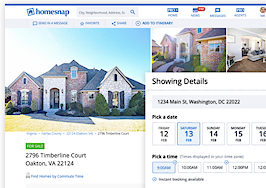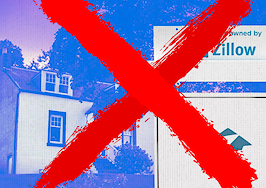A month after announcing it would be shutting down its Zillow Offers iBuying program, Zillow Group has already decided the fate of more than half the homes it intends to unload before the program draws to a complete close, the company announced Thursday.
Zillow also announced that the company would buy back up to $750 million of its own Class A common stock, Class C capital stock or a combination of both.
Zillow announced a pause in buying new homes in mid-October. The company has previously said it had 9,790 homes in its inventory at the end of September and it was under contract to buy another 8,172 homes, bringing the total number of homes the company would need to dispose of to about 18,000.
On Thursday, the company said it had “made significant progress in winding down Zillow Offers inventory and has sold, is under contract to sell or has reached agreement on disposition terms” for more than half of those 18,000 or so homes.
“We are pleased with the progress of our wind-down efforts and recognize that no longer operating Zillow Offers will allow us to have a more capital-efficient balance sheet and business moving forward,” said Zillow Group co-founder and CEO Rich Barton in a statement.
“With that, we see today as an opportune time to announce a share repurchase program and reduce the cash balance we built up to support Zillow Offers.”
In mid-November, news outlets reported that the Seattle-based listing giant had struck an agreement to sell 2,000 of its homes to New York City investment firm Pretium Partners, which has a portfolio of 70,000 single-family home rentals across 20 markets. On Thursday, a Zillow spokesperson told Inman that none of the other 7,000-plus homes dealt with so far were sold to institutional investors but rather “sold traditionally,” except for 400 whose contracts Zillow canceled earlier this week.
In a subsequent statement on Friday, Zillow clarified that some of the homes “sold traditionally” were sold to retail buyers and some were sold to investors, but not through “any new large agreements” as with the Pretium deal.
“We are focused on making the homes we are listing for sale available to movers as quickly as possible,” Zillow’s spokesperson said. “As we wind down our iBuying operations, we continue to sell homes the way we always have, which includes marketing them on the open market to sell them to all types of buyers such as individuals and families, institutional or individual investors, and nonprofits.”
The company declined to break down how many of its homes sold to each type of buyer.
The Pretium sale has prompted some scrutiny from the U.S. Congress. On Nov. 8, U.S. Senators Sherrod Brown, Tina Smith and Jack Reed sent Zillow a letter raising “serious concerns” about Zillow’s plan to dispose of its properties to institutional investors, given the for-sale inventory shortage across the nation. Brown is chair of the Senate Committee on Banking, Housing, and Urban Affairs and Smith is chair of the Senate Subcommittee on Housing, Transportation, and Community Development.
An analysis by Bloomberg found that Zillow and iBuying rivals Opendoor and Offerpad have sold more than 20 percent of their homes to institutional investors so far this year, the Los Angeles Times reported. For the latter two companies, this appears to be an increase from 2018, when they sold 1 in 10 homes to institutional investors such as Cerberus, Invitation Homes and Tricon American Homes.
“These large-scale property sales have the potential to destabilize local real estate markets and leave local buyers with few affordable options for buying a home,” the senators wrote.
“Troublingly, these types of sales have the ability to concentrate property ownership in the hands of a few, corporate-driven, out-of-town landlords with little meaningful connection to communities.”
Moreover, the senators highlighted concerns about how Pretium and its affiliates manage their properties.
“Residents have reported serious flooding issues, vermin infestations, and other unsafe conditions in homes managed by Pretium’s property arms,” they wrote. “Additionally, they have reported that Pretium’s managers are often unresponsive, and that tenants frequently face payment difficulties or seemingly predatory billing practices.”
They added that “in at least some areas of the country, these harms have been concentrated in communities of color, exacerbating longstanding inequities and limiting homebuying opportunities.”
Institutional investors Cerberus and Invitation Homes have also come under fire for allegedly mistreating tenants. The senators said that testimony at a recent hearing before the committee suggested such practices and their impacts “are widespread among institutional investor rental companies and local markets in which they have a significant footprint.”
The letter asked Zillow to:
- provide the number of iBuyer properties it intends to sell and list their location and the price Zillow paid to acquire the property
- describe what steps, if any, Zillow has taken to sell its remaining iBuyer properties to individual buyers or community-focused non-profits
- say how many properties Zillow’s iBuyer program has sold to individual buyers, community-focused non-profits, and institutional investors since January 1, 2020 and the number of units sold to each
- say whether Zillow intends to allow local buyers a “first look” opportunity to buy properties, similar to programs offered by the Federal Housing Administration, Fannie Mae, and Freddie Mac
Zillow’s spokesperson confirmed to Inman that the company had responded to the Senate’s letter, but declined to provide details regarding its response. The company declined to say whether it intended to allow local buyers the first chance to buy its properties.
Zillow made the decision to shutter Zillow Offers after the company made more purchases than intended and at high market prices. Homes were sitting on the market for longer and starting to sell for a loss more often. The company cited problems with the ability of its algorithms to accurately predict future home prices and supply-chain issues behind its decision.
An Insider report also found that Zillow’s mad dash to catch up with its rivals by paying more for homes but leaving less funds to pay repair contractors damaged Zillow’s relationships with those contractors, leaving homes on the market longer as they took longer to fix.
Zillow’s intent was to gain market share over the company’s iBuyer rivals, such as Opendoor, Offerpad and RedfinNow. But Zillow suffered heavy financial losses in the process, including $422 million between July and September from its Homes division alone.
As part of its announcement Thursday, Zillow updated its fourth-quarter outlook, upping its expectations for revenue from its Homes segment to a range of $2.3 billion to $2.9 billion compared to the previous forecast from $1.7 billion to $2.1 billion.
Zillow probably earned nearly $750 million on the Pretium deal, the Los Angeles Times reported, citing a note from analysts at Berenberg Capital Markets.
“We are pleased with the significant Zillow Offers inventory wind-down progress we’ve made in such a short time,” said Zillow Group CFO Allen Parker in a statement. “We will continue to be disciplined in our inventory wind-down strategy and evaluate a variety of options to best optimize net cash flows to the company.”
Zillow’s share price rose on Thursday’s announcement, after tumbling over the past month as the company faces continued public scrutiny and securities fraud lawsuits due to Zillow Offers’ closure. The stock is still down more than 59 percent year to date.
“The company continues to expect the net impact of the Zillow Offers wind-down of inventory (including inventory losses), operating costs, and restructuring costs in the aggregate, to be at least cash-flow neutral, including after repaying all Zillow Offers secured debt, which was $2.9 billion as of Sept. 30, 2021,” the company said.
Regarding the stock buyback program, Zillow said management would determine the timing and actual number of shares repurchased depending on factors such as stock price, trading volume, and market conditions, among others.
Stock buybacks are often done in order to shore up a company’s stock price or because the company feels its stocks are undervalued or to improve the company’s earnings per share ratio. Zillow’s spokesperson declined to say whether these were among the reasons the company is buying back its stock.
Thus far, Zillow is facing two class-action lawsuits, brought by shareholder plaintiffs Dibakar Barua and Steven Silverberg, alleging the company committed securities fraud by misleading investors about the company’s business and prospects.
“We are aware of the lawsuits filed recently and are currently reviewing them,” Zillow’s spokesperson said in an emailed statement. “As a general practice, we do not discuss pending litigation.”
Editor’s note: This story has been updated with additional comments from Zillow.













